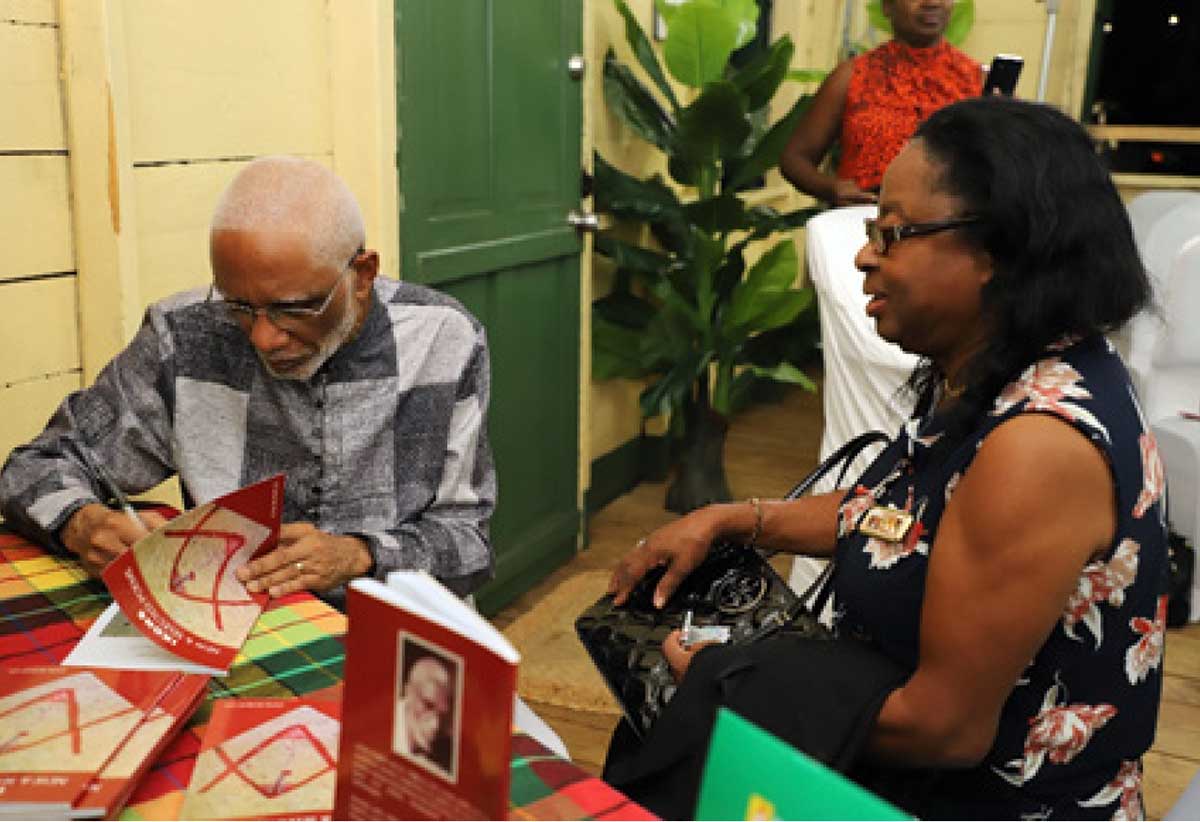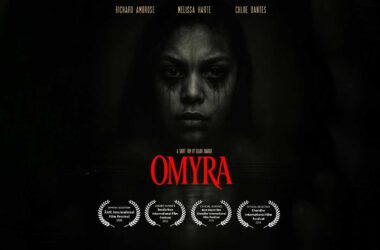
It was an evening of fine poetry and folk music – January 30, 2024. A cool Tuesday evening on the little knoll nestled between the Chaussée and Darling Roads, home to the iconic 19th Century Anglican Church and the historic Anglican Annex where the book launch event happened, which provided the ambiance.
The occasion was a cultural soirée (swawé) with Caribbean and Saint Lucian poet John Robert Lee (JRL) accompanied by Augustin Julian’s (Charley’s) Manmay Lakay folk band. Robert was launching his latest collection of poetry, “IKONS, New and Selected Poems”. It was one of the final events of this year’s Nobel laureate Festival and of FRC’s celebrations of its 50th anniversary.
In his foreword to the collection, Embert Charles, Chairman of the Msgr. Patrick Anthony Folk Research Centre notes not only that “IKONS is a fitting gift of the poet’s seventy-fifth birthday [and] a recognition of John Robert Lee’s more than 50 years as a hard working communicator and poet,” but also that this latest work is a collection that recognises fellow artists and poets , among whom are “Charles Cadet, Derek Walcott, George Lamming, George Fish Alphonse, George Goddard, Gandolph St. Clair, Joyce Auguste, Patricia Charles, Yves Renard, Garth St. Omer, Morgan Dalphinis, Shallon Fadlien, Raphael Philip and Ras Mosera”.
JRL, reading in his inimitable conversational style, and to the backdrop of music by Manmay Lakay, held the appreciable cohort of invitees enraptured with poems like White Cedar, Office hours, Ikons (the title poem of the collection), Watchman, from Belmont Portfolio, Lament for Ti Kongo, Vigil, One of us has died and The Return.
While the decision to house the event at the historic Anglican Annex is laudable, the book-launch which brought Nobel Laureate Month to an end, and in a very fitting way ushered in Independence Month, underscored the need to create appropriate spaces for more frequent activities of this type across Saint Lucia. And the need to create a home for the arts. Walcott House on the Chaussée can be developed, and the Gros Islet Vladimir Lucien Theatre is an excellent venue, but we need a national home for the arts as well as facilities in various parts of the country.
As the title page of Robert’s latest work indicates, the collection brings together new work as well as previously published work from collections like Pierrot, Song & Symphony and the recent Belmont Portfolio. It also includes art by some of our notable painters and sculptors. It has become a singular mark of John Robert Lee’s work to iconise our artistic tradition and to celebrate our contemporary art and the artists who create in different forms and genres. Artists whose work complements the poetry include Adrian Augier, Shallon Fadlien, Ras Mosera, Jallim Eudovic, Ken Lawrence and Gary Butte. The cover illustration and a number of other photographs were taken by Finola Jennings Clark at the now demolished historic 200-year-old Castries prison. The artists are unknown whose work decorated the walls of the prison.
The collection and its launching, a celebration of our poets and artists, was attended by H.E. Dame Pearlette Louisy Governor General Emerita, Former Prime Minister Hon. Dr. Kenny D. Anthony, Hon. Moses Musa Jn. Baptiste (himself a kwéyòl poet and cultural activist) Msgr. Patrick Anthony, Ms. Rhyesa Joseph and Embert Charles of the FRC, UNESCO representative Ms. Marcia Symphorien as well as a number of poets, artists and cultural activists. The Pat Charles Endowment Foundation and UNESCO contributed to the cost of the book’s printing. Lee dedicated the book to Dr. Kenny Anthony and Msgr Patrick Anthony, life-long friends. The collection also carries an In Memoria to several cultural figures who have passed on.
It should be noted, that this work, as much of his other writing, also recognises the contributions of the wider Caribbean art landscape and addresses themes that are at the same time of regional and world import. The publishing of his writing by significant international publishers like Peepal Tree and Papillote Press are testimony to this.
The new book, its launching and the fact that the proceeds from its sale are intended to go towards the establishment of a home for needy artists underlines the observations made in one of my reviews of John Robert Lee’s work, regarding his cultural engagement – that it is as much a labour of love and social activism as it is artistic expression. It is the poet and writer as activist, not as an innocuous and disengaged observer.
While the poet’s Faith is confirmed in pieces like The photos in obituary pages will surprise you, Watchman, and from Belmont Portfolio Part Two, an activism that is indivisible from his Faith is reflected in poems that are not afraid to take on a somewhat polemical tone like Vigil, Lament for Ti Kongo, Masquerade, and Etude.
There are poems of love intertwined with faith, faith intertwined with activism that often takes up cudgels against the system of:
‘…liberal democracy that plants burning crosses
on their lawns, knees in their necks, metal in their fleeing backs,
that makes them invisible ciphers fenced in minority ghettos.’
It’s an activism that is not restricted to culture but to a broader social perspective in which he does not shy away from issues with political and geopolitical implications. In one slim volume, IKONS is as reflective as his earlier works, of JRL’s continuing sojourn through this cultural and sociopolitical landscape (and seascape).
IKONS displays a mastery of form, imagery, metaphor and English and Caribbean registers that, to quote Walcott, marks him indeed as a ‘scrupulous poet’. His “glosas” are particularly interesting.
The swawé ended with Robert reading poems intended to be included in future collections. The poem, “Gaza” was particularly riveting and poignant. I am looking forward to more of the artistic oeuvre of this most prolific and gifted Saint Lucian poet and writer.
George Goddard is a Saint Lucian writer. His new collection Kité flit-ka menen l’espwi-ou with art by Alwin St. Omer will be published this year by the Msgr Patrick Anthony Folk Research Centre (FRC).







![Simón Bolívar - Liberator of the Americas [Photo credit: Venezuelan Embassy]](https://thevoiceslu.com/wp-content/uploads/2025/12/Simon-Bolivar-feat-2-380x250.jpg)



